- Clone
- GIR-208 (See other available formats)
- Regulatory Status
- RUO
- Workshop
- VI C-110
- Other Names
- IFN-γR, IFN-γRα, IFN-gamma R1, CDw119
- Isotype
- Mouse IgG1, κ
- Ave. Rating
- Submit a Review
- Product Citations
- publications
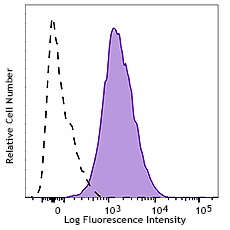
-

Human peripheral blood lymphocytes stained with CD119 (clone GIR-208) PE (filled histogram) or mouse IgG1, κ PE isotype control (open histogram).
| Cat # | Size | Price | Quantity Check Availability | Save | ||
|---|---|---|---|---|---|---|
| 308606 | 100 tests | 244 CHF | ||||
CDw119 is a 90-100 kD type I transmembrane protein, also known as IFN-γ R α chain or IFN-γRI. The IFN-γ receptor is a complex of a high affinity IFN-γ-binding chain (aka, IFN-γ R α chain) and a second accessory protein required for signal transduction known as IFN-γ R β chain. The IFN-γ R α chain is a member of the class II cytokine receptor family. Binding of IFN-γ induces receptor dimerization and internalization. Signal transduction involves Jak1 and Jak2 protein kinases and involves STAT1 activation. The IFN-γ receptor is expressed at moderate levels on virtually every cell with the exception of erythrocytes.
Product DetailsProduct Details
- Verified Reactivity
- Human
- Reported Reactivity
- African Green, Baboon, Cynomolgus, Rhesus
- Antibody Type
- Monoclonal
- Host Species
- Mouse
- Immunogen
- Human IFN-γRα, Purified from human placenta
- Formulation
- Phosphate-buffered solution, pH 7.2, containing 0.09% sodium azide and BSA (origin USA)
- Preparation
- The antibody was purified by affinity chromatography, and conjugated with PE under optimal conditions.
- Storage & Handling
- The antibody solution should be stored undiluted between 2°C and 8°C, and protected from prolonged exposure to light. Do not freeze.
- Application
-
FC - Quality tested
- Recommended Usage
-
Each lot of this antibody is quality control tested by immunofluorescent staining with flow cytometric analysis. For flow cytometric staining, the suggested use of this reagent is 5 µl per million cells in 100 µl staining volume or 5 µl per 100 µl of whole blood.
- Excitation Laser
-
Blue Laser (488 nm)
Green Laser (532 nm)/Yellow-Green Laser (561 nm)
- Application Notes
-
Additional reported applications (for the relevant formats) include: Western blotting1 under non-reducing conditions, immunoprecipitation1, immunohistochemistry3 of snap frozen sections, and blocking1 of IFN-? binding to IFN-? R a chain. For most successful immunofluorescent staining results, it may be important to maximize signal over background by using a relatively bright fluorochrome-antibody conjugate (Cat. No. 308606) or by using a high sensitivity, three-layer staining technique (e.g., including a biotinylated anti-mouse IgG second step (Cat. No. 405303), followed by SAv-PE (Cat. No. 405204)). The Ultra-LEAF™ Purified antibody (Endotoxin < 0.01 EU/µg, Azide-Free, 0.2 µm filtered) is recommended for functional assays (Cat. Nos. 308609 & 308610).
-
Application References
(PubMed link indicates BioLegend citation) -
- Sheehan K, et al. 1988. J. Immunol. 140:4231. (WB IP Block)
- Kishimoto T, et al. Eds. 1997. Leucocyte Typing VI. Garland Publishing Inc. London.
- Peyman JA, et al. 1992. J. Immunol. 149:2675. (IHC)
- Product Citations
-
- RRID
-
AB_314726 (BioLegend Cat. No. 308606)
Antigen Details
- Structure
- Ig superfamily, class II cytokine receptor family, associates with IFN-γ receptor β subunit, 90-100 kD
- Distribution
-
Macrophages, monocytes, B, T, and NK cells, neutrophils, endothelial and epithelial cells, fibroblasts
- Function
- Activates Jak1, Jak2, STAT1, host defense
- Ligand/Receptor
- IFN-γ
- Cell Type
- B cells, Endothelial cells, Epithelial cells, Macrophages, Monocytes, Neutrophils, NK cells, T cells
- Biology Area
- Immunology
- Molecular Family
- CD Molecules, Cytokine/Chemokine Receptors
- Antigen References
-
1. Calderon J, et al. 1988. P. Natl. Acad. Sci. USA 85:4837.
2. Basler C, et al. 2002. Int. Rev. Immunol. 21:305.
3. Brierley M, et al. 2002. J. Interferon Cytokine Res. 22:835. - Gene ID
- 3459 View all products for this Gene ID
- UniProt
- View information about CD119 on UniProt.org
Related FAQs
- What type of PE do you use in your conjugates?
- We use R-PE in our conjugates.
Other Formats
View All CD119 Reagents Request Custom Conjugation| Description | Clone | Applications |
|---|---|---|
| PE anti-human CD119 (IFN-γ R α chain) | GIR-208 | FC |
| TotalSeq™-A0219 anti-human CD119 (IFN-γ R α chain) | GIR-208 | PG |
| Ultra-LEAF™ Purified anti-human CD119 (IFN-γ R α chain) | GIR-208 | FC |
| TotalSeq™-B0219 anti-human CD119 (IFN-γ R α chain) | GIR-208 | PG |
| TotalSeq™-C0219 anti-human CD119 (IFN-γ R α chain) | GIR-208 | PG |
Customers Also Purchased
Compare Data Across All Formats
This data display is provided for general comparisons between formats.
Your actual data may vary due to variations in samples, target cells, instruments and their settings, staining conditions, and other factors.
If you need assistance with selecting the best format contact our expert technical support team.
-
PE anti-human CD119 (IFN-γ R α chain)
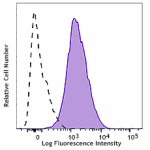
Human peripheral blood lymphocytes stained with CD119 (clone... -
TotalSeq™-A0219 anti-human CD119 (IFN-γ R α chain)
-
Ultra-LEAF™ Purified anti-human CD119 (IFN-γ R α chain)
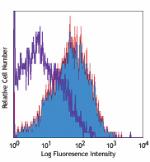
Human peripheral blood lymphocytes stained with LEAF™ purifi... -
TotalSeq™-B0219 anti-human CD119 (IFN-γ R α chain)
-
TotalSeq™-C0219 anti-human CD119 (IFN-γ R α chain)

 Login / Register
Login / Register 










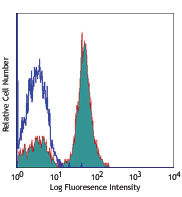
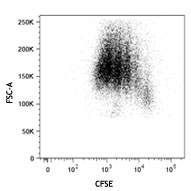
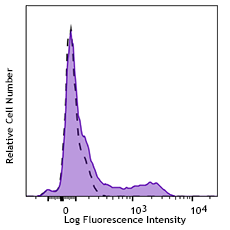




Follow Us